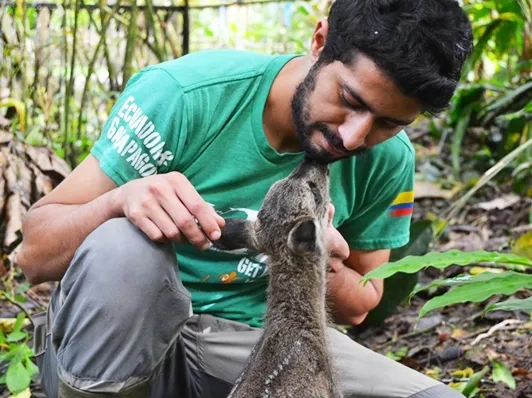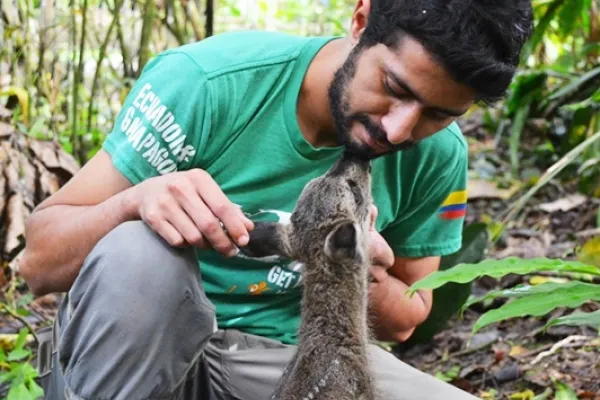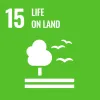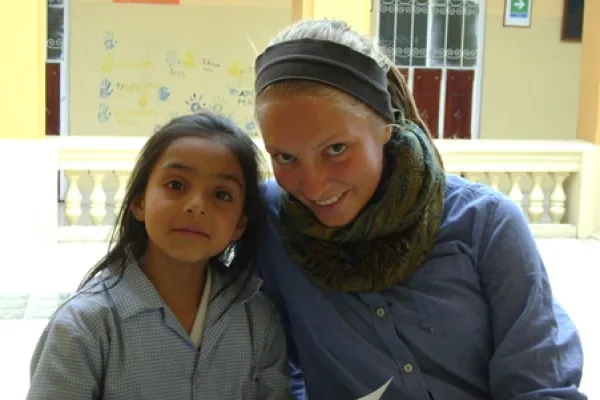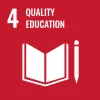Overview
Dieses Projekt befindet sich im ecuadorianischen Regenwald und hat zum Ziel, Tiere zu retten, zu rehabilitieren und, wenn möglich, wieder in ihren natürlichen Lebensraum auszuwildern.
Das Zentrum arbeitet mit der ecuadorianischen Umweltpolizei (UPMA) und dem Umweltministerium zusammen, um gegen den Handel, die Misshandlung, das Fangen und die Jagd auf Wildtiere vorzugehen. Das Zentrum ist sehr gut organisiert, und Freiwillige können bei der Tierpflege und Instandhaltung helfen.
Dieses Projekt wurde 2006 mit dem Ziel gegründet, die Tierwelt des Amazonasgebiets durch die Rettung und Rehabilitation einheimischer Pflanzen und Tiere zu schützen. Die Tiere im Zentrum wurden alle misshandelt, vernachlässigt oder ausgesetzt. Einige wurden verwaist, als ihre Eltern von Jägern getötet wurden, andere wurden von Tierhändlern gerettet, die versuchten, die Tiere außer Landes zu bringen, und viele wurden aus Familien befreit, die sie in Gefangenschaft gehalten hatten. Leider haben die meisten von ihnen irgendeine Form von körperlicher oder seelischer Misshandlung erlitten.
Im Zentrum gibt es derzeit mindestens 40 verschiedene Tierarten, darunter: Ozelot, Tayra, Wasserschwein, Papageien, Affen, Schildkröten und Kaimane.
Das Zentrum ist auch für Touristen geöffnet und erhebt einen geringen Eintrittspreis, der die einzige weitere Einnahmequelle darstellt. Da Tierschutz für viele Ecuadorianer keine hohe Priorität hat, werden Touristen die Vorgeschichte und die Misshandlung jedes einzelnen Tieres erläutert, um einheimische und ausländische Besucher für Tierschutzthemen zu sensibilisieren. Die Besuche sind in der Regel nicht geführt, aber Touristen können sich auf den Informationstafeln an den Käfigen über die einzelnen Tiere informieren.
Möchten Sie weitere Möglichkeiten kennenlernen, etwas zu bewirken? Dann schauen Sie sich unsere Freiwilligenprogramme in Südamerika an.
Freiwilligenarbeitsplan
Freiwilligenarbeitsplan
An Ihrem ersten Tag nehmen Sie an einer Einführungsveranstaltung teil, in der wir die geplanten Aktivitäten der kommenden Tage besprechen. Dies ist auch eine Gelegenheit, Ihre Erwartungen zu äußern und Ihre Talente und Interessen zu entdecken, damit Ihr Freiwilligeneinsatz sowohl für das Projekt gewinnbringend als auch persönlich bereichernd wird.
Nach der Einarbeitung legen Sie direkt los. Jeder Tag ist anders, und Ihre Aufgaben variieren je nach Projektbedarf. Wir schätzen Ihre Flexibilität und Hilfsbereitschaft. Von Montag bis Freitag gibt es ein Mittagessen direkt am Projektstandort, sodass Sie eine Mittagspause haben. Anschließend arbeiten Sie bis ca. 17 Uhr weiter.
Der Rest des Tages steht Ihnen zur freien Verfügung. Ihr Wochenplan folgt in der Regel einem ähnlichen Muster mit Arbeitszeiten von 8:00 bis 17:00 Uhr, Montag bis Freitag. Der Koordinator wird Sie dort einsetzen, wo Sie am dringendsten gebraucht werden, und wir freuen uns auch über Ihre Ideen!
An jedem zweiten Wochenende, entweder Samstag oder Sonntag, helfen Freiwillige vormittags ein paar Stunden beim Füttern der Tiere. Den Rest des Wochenendes haben Sie zur freien Verfügung, um die Gegend zu erkunden oder sich zu entspannen.
Ehrenamtliche Aufgaben und Verantwortlichkeiten
Ehrenamtliche Aufgaben und Verantwortlichkeiten
Jede Aktivität trägt zum Wohlbefinden der Tiere und zum reibungslosen Ablauf im Tierrettungszentrum bei. Freiwillige sind in der Regel in folgende Aufgaben eingebunden:
Tägliche Tierpflege: Kümmern Sie sich um die täglichen Bedürfnisse der Tiere.
Futterzubereitung und Fütterung: Obst klein schneiden, Futter zubereiten und die Tiere verfüttern.
Hilfe für Neuankömmlinge: Unterstützen Sie neue Tiere bei der Eingewöhnung im Zentrum
Allgemeine Instandhaltung: Wartungs- und Reinigungsarbeiten im Zentrum durchführen.
Bauarbeiten: Reparatur und Neubau von Umzäunungen zur Verbesserung der Anlagen
Beschäftigungsmaßnahmen: Käfige und Gehege so gestalten, dass die Tiere beschäftigt bleiben.
Training: Trainieren Sie Tiere, die nicht freigelassen werden können, um Stress abzubauen, insbesondere während medizinischer Untersuchungen.
Tierärztliche Unterstützung: Unterstützen Sie den Tierarzt bei Bedarf
Zusätzliche Aufgaben: Gartenarbeit verrichten, Wege ausbauen und Schilder für Besucher anfertigen.
Project Requirement
Project Requirement
Freiwillige müssen zum Zeitpunkt der Teilnahme am Projekt 18 Jahre oder älter sein. Sie müssen aufgeschlossen und flexibel sein, um in einer neuen und anderen Umgebung zu arbeiten. Der Freiwillige sollte Energie und Enthusiasmus mitbringen, um etwas zu bewirken. Die Teilnehmer müssen zum Zeitpunkt der Teilnahme am Programm fit und gesund sein und sollten bereit sein, im Freien zu arbeiten und sich die Hände schmutzig zu machen. Teilnehmer des Programms sollten ein ausgeprägtes Interesse und eine Liebe für die Tierschutzarbeit mitbringen. Die Teilnehmer sollten keine kriminellen Verurteilungen haben und einen einwandfreien kriminalpolizeilichen Hintergrundbericht vorlegen.
Schedule a Google Meet with a Program Advisor
Interested in our programs? We're here to provide expert guidance
- Get Detailed Info
- 20 min One -on-One meeting
- Get expert advise
- Application Guidance
Photo Gallery
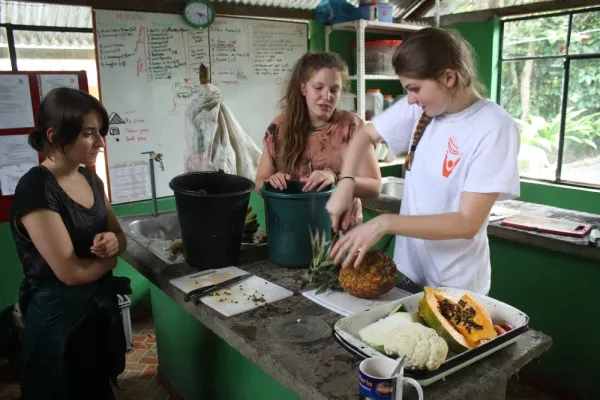
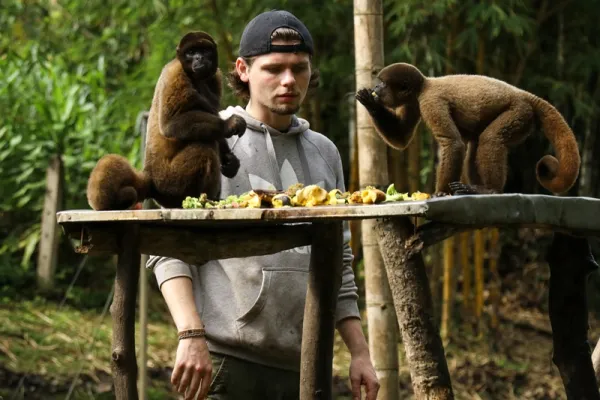

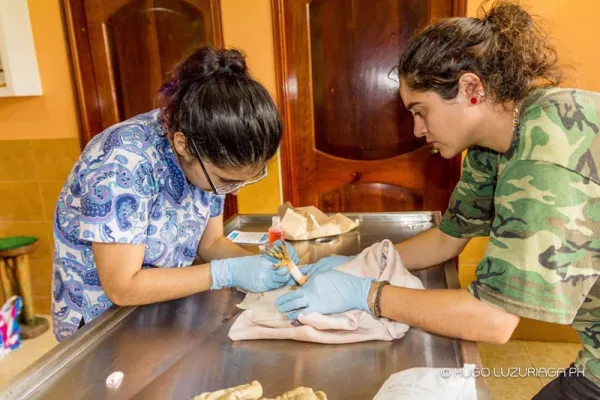
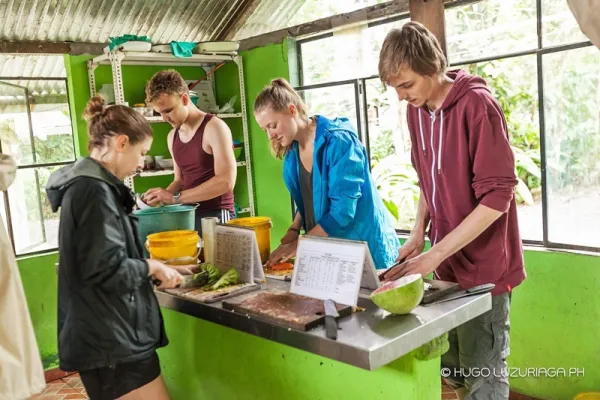
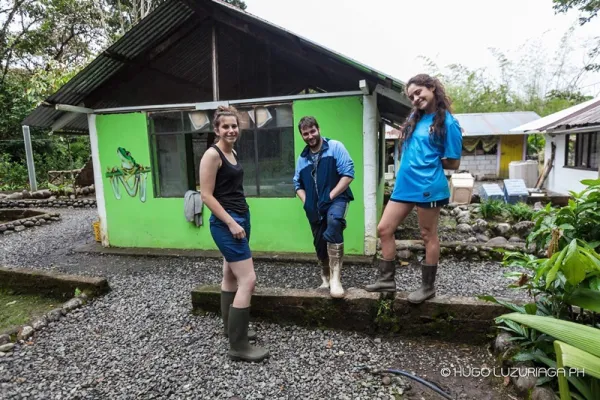
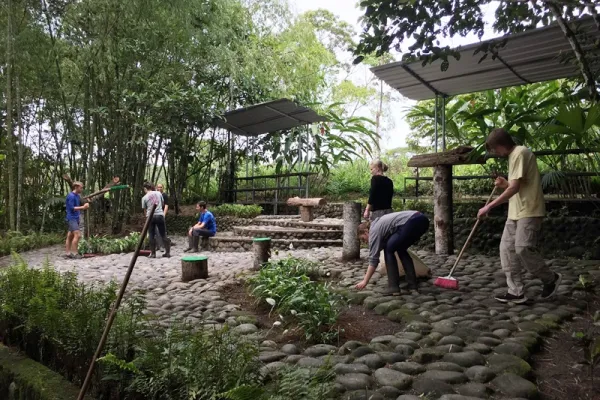
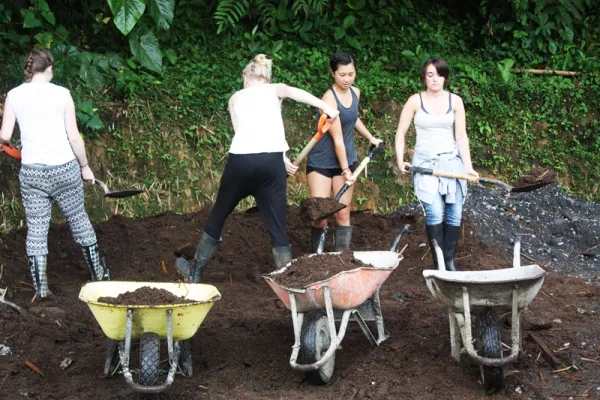
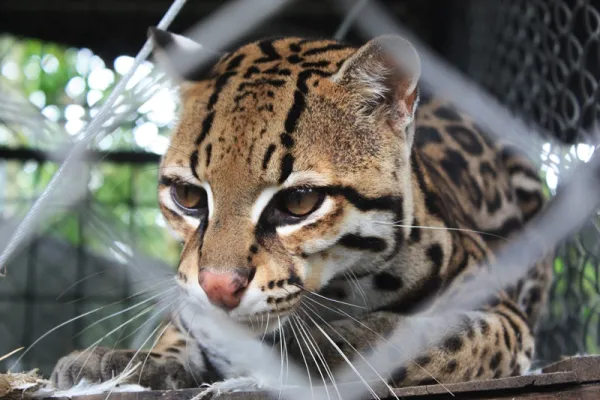
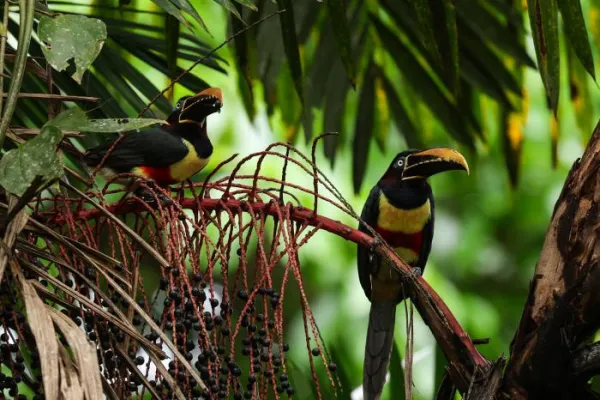

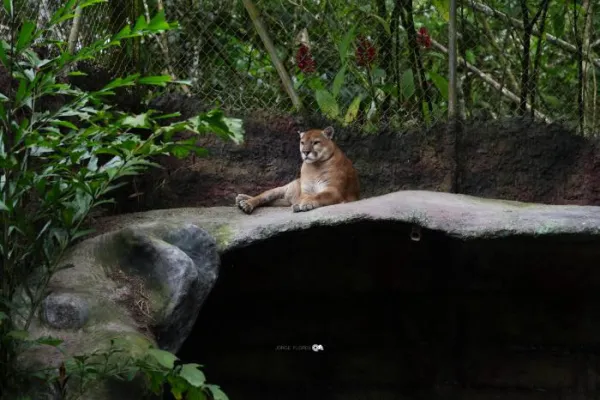
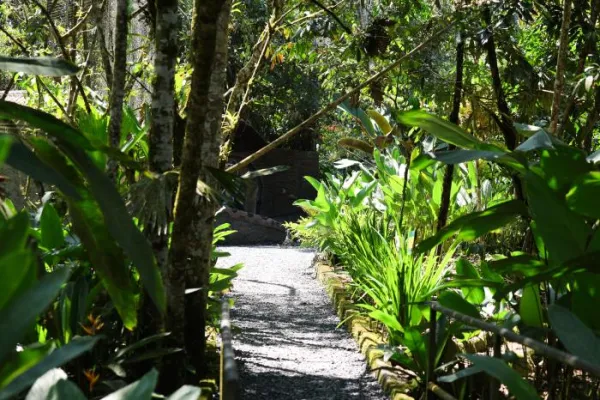
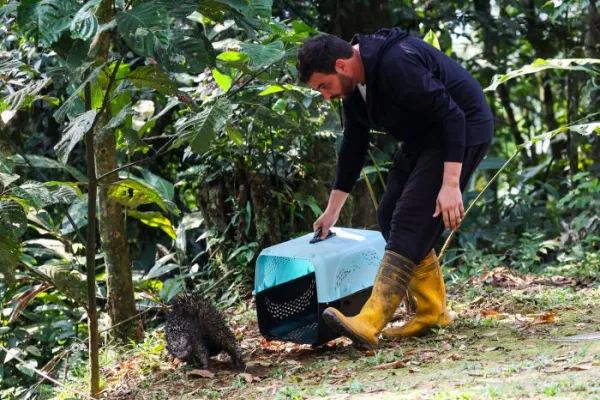
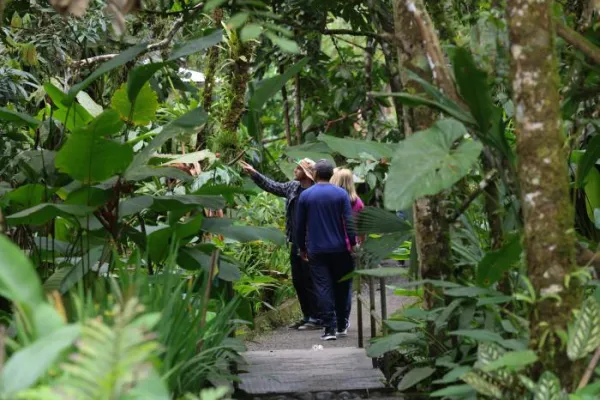
Living
Living
Flughafentransfer
Freiwillige werden vom VolSol-Personal oder dem Koordinator vor Ort vom internationalen Flughafen Mariscal Sucre abgeholt. Freiwillige, die sich bereits in Quito befinden, können direkt in der Herberge in Quito ankommen.
Unterkunft
Bei der Ankunft in Quito werden die Freiwilligen für eine Nacht in einem zentral gelegenen Hostel untergebracht. Nach dem Transfer zum Projekt in Puyo werden die Freiwilligen vor Ort in gemeinschaftlich genutzten Cabanas untergebracht.
Die Cabañas für Freiwillige im Animal Rescue Center bieten Schlafsäle für bis zu 17 Personen. Sie haben Zugang zu Gemeinschaftsküche und -bad sowie einem Gemeinschaftsbereich mit Fernseher, DVD-Player, Hängematten und einer Auswahl an Büchern. Die Unterkunft ist einfach, aber komfortabel und schafft eine gemeinschaftliche Atmosphäre unter den Freiwilligen.
Zusätzlich zu diesen grundlegenden Annehmlichkeiten können Sie in der Gemeinschaftsküche Ihre eigenen Mahlzeiten zubereiten oder gemeinsam mit anderen Freiwilligen kochen. Die Badezimmer werden gemeinsam genutzt, bitte seien Sie daher rücksichtsvoll. Der Gemeinschaftsbereich bietet den perfekten Ort zum Entspannen nach einem Arbeitstag, egal ob Sie einen Film ansehen, ein gutes Buch genießen oder in einer Hängematte entspannen möchten.
Orientierung
Unsere Mitarbeiter vor Ort bieten den Freiwilligen eine umfassende Orientierungsveranstaltung an. Die Orientierung umfasst Informationen zu Ihrem Projekt und andere wichtige Informationen. Vor Ort stellt das Programmpersonal den Freiwilligen das Projekt und die lokalen Projektmitarbeiter vor und unterstützt sie bei der grundlegenden Einarbeitung.
Mahlzeiten
Freiwillige erhalten von Montagmorgen bis Samstagmittag drei Mahlzeiten pro Tag. Außerhalb dieser Zeiten können Freiwillige im nahegelegenen Puyo essen oder in der Gemeinschaftsküche kochen. Es wird erwartet, dass Freiwillige beim Kochen und Putzen mithelfen. Freiwillige können auch Ausflüge in die Stadt unternehmen, um zusätzliche Lebensmittel/Snacks zu kaufen. Bitte beachten Sie, dass im Hostel in Quito nur Frühstück angeboten wird. Für weitere Mahlzeiten müssen Sie selbst sorgen.
In Ihrer Freizeit
Während der Projektzeit können sich Freiwillige vor allem mit anderen Freiwilligen austauschen. WLAN steht ihnen auch in ihrer Freizeit zur Verfügung. Um an Wochenenden nach Quito oder an andere Orte zu reisen, können Freiwillige ein Taxi zum Busbahnhof („El Terminal“) nehmen und von dort aus einen Bus nehmen.
So können Sie nach dem Freiwilligendienst entspannen:
Entspannen und neue Kraft tanken: Lehnen Sie sich mit einem Buch in einer Hängematte zurück oder spielen Sie Brett- und Kartenspiele mit anderen Freiwilligen
Entdecken Sie Puyo: Nur 15 Autominuten entfernt bietet Puyo einen Kurzurlaub mit lokalem Flair
Abenteuer in Baños: Baños ist mit dem Bus etwa 1 Stunde und 20 Minuten entfernt und ein Hotspot für Extremsport und Spaß. Genießen Sie Thermalbäder, tanzen Sie die Nacht durch oder probieren Sie Mountainbiken, Rafting, Canopying und erkunden Sie Wasserfälle in der Nähe des aktiven Vulkans Tungurahua.
Dschungeltour in Tena: Wagen Sie sich für 2 Stunden nach Tena und erleben Sie ein authentisches Dschungelerlebnis.
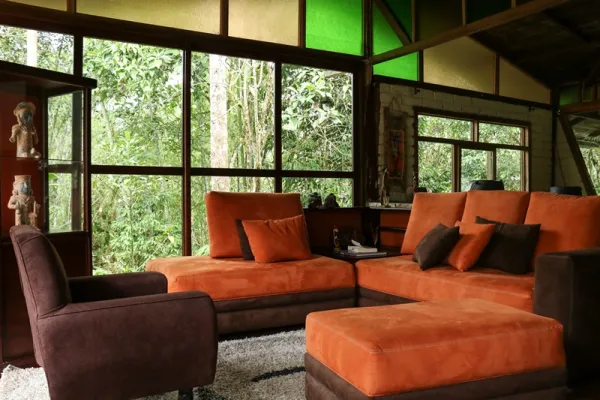

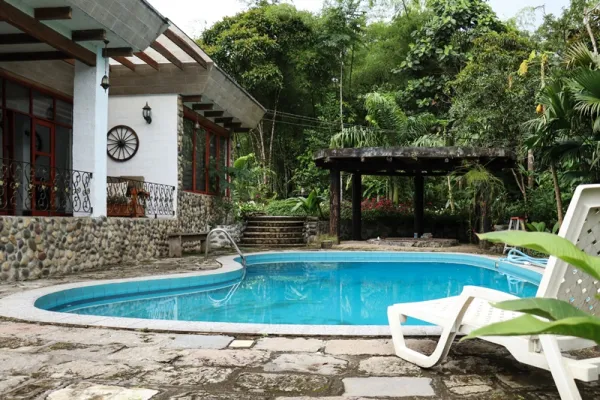
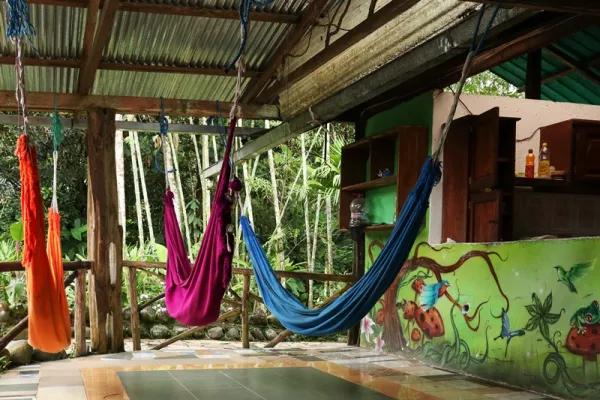

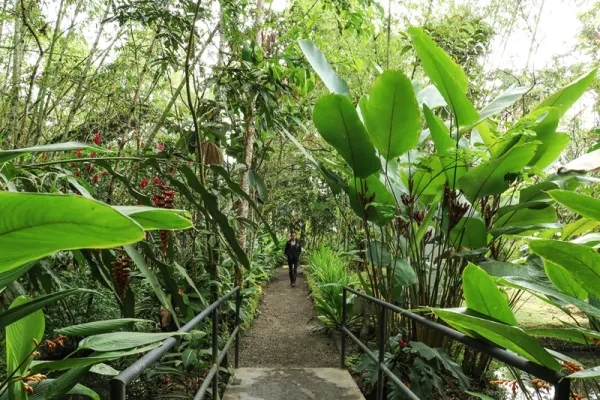
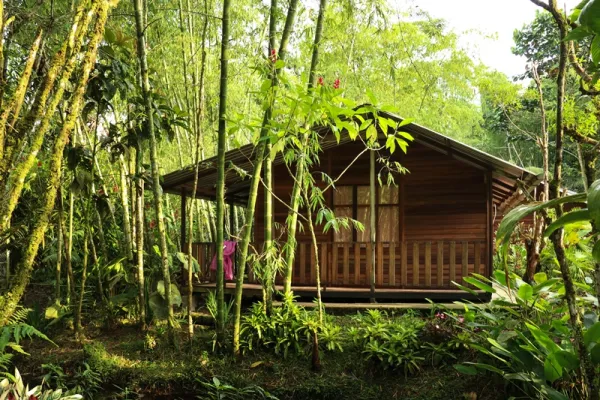
Dates
Dates
January
03
10
17
24
31
February
07
14
21
28
March
07
14
21
28
April
04
11
18
25
May
02
09
16
23
30
June
06
13
20
27
July
04
11
18
25
August
01
08
15
22
29
September
05
12
19
26
October
03
10
17
24
31
November
07
14
21
28
December
05
12
19
26
January
02
09
16
23
30
February
06
13
20
27
March
06
13
20
27
April
03
10
17
24
May
01
08
15
22
29
June
05
12
19
26
July
03
10
17
24
31
August
07
14
21
28
September
04
11
18
25
October
02
09
16
23
November
06
13
20
27
December
04
11
18
Costs
| Duration |
Program Fee
|
Choose your currency
|
|---|---|---|
| 2 Weeks | $891 | |
| 3 Weeks | $1118 | |
| 4 Weeks | $1370 | |
| 5 Weeks | $1597 | |
| 6 Weeks | $1849 | |
| 7 Weeks | $2076 | |
| 8 Weeks | $2303 | |
| Extra Week | $300 |
Please Note: A registration fee of is charged in addition to the program fee. This fee is valid for one year, during which participants may enroll in multiple programs. A 5% international banking fee applies to credit card payments of program fee made in USD or AUD.
Wofür zahlen Sie?
- Abholung vom Flughafen von Quito
- Eine Übernachtung in einem Hostel in Quito
- Unterkunft im Projekt in Puyo
- Informationsleitfaden vor der Abreise
- Orientierung
- Unterstützung durch lokales Personal
- Alle Mahlzeiten an Wochentagen
- Transfer zum Busbahnhof in Quito, um nach Puyo zu reisen
Was ist NICHT enthalten?
- Flüge
- Rücktransfer zum Flughafen Quito
- Rücktransfer vom Projekt nach Quito
- Mahlzeiten am Wochenende
- Persönliche Ausgaben
- Busticket kostet von Quito nach Puyo
FAQ's
Flug-, Ankunfts- und Visainformationen
-
Welche Visabestimmungen und welches Verfahren gelten für die Einreise nach Ecuador?
-
Bürger aus über 90 Ländern – darunter Großbritannien, die USA, Kanada, die EU-Staaten, Australien, Neuseeland und der größte Teil Lateinamerikas – können visumfrei nach Ecuador einreisen und sich dort bis zu 90 Tage aufhalten.
-
Welche Fluggesellschaften sind für Flüge nach Quito, Ecuador empfehlenswert?
-
Die besten Fluggesellschaften für Flüge nach Quito, Ecuador (UIO), hängen von Ihrem Abflugort ab. Mehrere Airlines bieten jedoch regelmäßig zuverlässige und komfortable Verbindungen an. Aus Europa ist KLM die beste Wahl, da sie als einzige Fluggesellschaft einen Direktflug von Amsterdam nach Quito anbietet. Iberia und Air Europa bieten gute Verbindungen mit einem Zwischenstopp in Madrid. Reisende aus Großbritannien fliegen üblicherweise über Europa oder die USA. KLM, Iberia und Air Europa bieten hier die bequemsten Verbindungen, ebenso wie American Airlines, United und Delta über große US-Drehkreuze. Aus den USA sind American Airlines ab Miami, United ab Houston, Delta ab Atlanta und LATAM ab Miami die zuverlässigsten Fluggesellschaften mit Direktflügen nach Quito. Kanadische Reisende erreichen Quito über Verbindungen mit American oder United. Innerhalb Südamerikas bieten LATAM, Avianca und Copa Airlines ein starkes regionales Streckennetz mit guten Anschlussmöglichkeiten nach Quito. Insgesamt gelten KLM, Iberia, American, United, Delta und LATAM als die empfehlenswertesten Fluggesellschaften hinsichtlich Komfort, Zuverlässigkeit und Anschlussmöglichkeiten.
-
Wann muss ich für mein Programm in Ecuador ankommen? Was passiert nach meiner Ankunft in Ecuador?
-
Alle Freiwilligen müssen am angegebenen Ankunftstag, in der Regel einem Samstag, in Quito eintreffen. Sie werden von einem Mitarbeiter am internationalen Flughafen Mariscal Sucre (UIO) abgeholt und noch am selben Tag in ihre Unterkunft in Quito gebracht. Am nächsten Tag erhalten die Teilnehmer, die nach Puyo fahren, eine Einweisung und werden zum Busbahnhof gebracht, um von dort aus weiterzureisen. Diejenigen, die das Programm in Quito absolvieren, erhalten am darauffolgenden Tag eine Einweisung und werden zum Projekt gebracht.
Gesundheit, Sicherheit und Unterstützung
-
Wie sicher ist Quito in Ecuador?
-
Quito und Puyo gelten im Allgemeinen als sichere Reiseziele, dennoch gibt es in beiden Städten unterschiedliche Dinge zu beachten. In Quito, einer großen Hauptstadt, kommt es häufiger zu Kleinkriminalität wie Taschendiebstahl und Handtaschenraub, insbesondere in belebten Touristengebieten und im öffentlichen Nahverkehr. Besucher sollten daher wachsam sein, Wertsachen nicht sichtbar tragen, registrierte oder per App bestellte Taxis nutzen und nachts in ruhigeren Vierteln nicht allein unterwegs sein. Puyo, am Rande des Amazonas gelegen, bietet eine entspanntere Kleinstadtatmosphäre mit niedrigeren Kriminalitätsraten. Die meisten Risiken beziehen sich hier eher auf Aktivitäten im Freien als auf die Sicherheit im Stadtgebiet. Grundlegende Vorsichtsmaßnahmen wie das Sichern von Wertsachen, Vorsicht in der Nacht und das Befolgen der Ratschläge lokaler Guides bei Regenwaldausflügen tragen zu einem unbeschwerten Aufenthalt bei. Insgesamt sind beide Orte sicher für Reisende, die vernünftige und umsichtige Vorsichtsmaßnahmen treffen.
-
Welche Impfungen benötige ich?
-
Wir empfehlen Ihnen, vor Ihrer Reise nach Ecuador Ihren Hausarzt oder Reisemediziner zu konsultieren. Gelbfieberimpfung: Nur erforderlich, wenn Sie aus einem Land einreisen, in dem Gelbfieber endemisch ist (z. B. Brasilien, Kolumbien, Peru, Teile Afrikas). Nicht erforderlich bei Direktflügen aus Europa, Nordamerika, Großbritannien, Australien oder den meisten asiatischen Ländern.
Für Reisende nach Ecuador werden folgende Impfungen empfohlen.
- Gelbfieber
- Hepatitis A und B
- Typhus
- Tetanus (Empfohlen für Freiwillige des Puyo-Projekts)
Nehmen Sie Kontakt zu ehemaligen Freiwilligen auf
-
Wie kann ich mit ehemaligen Freiwilligen von Volunteering Solutions Ecuador sowie mit anderen ehemaligen und aktuellen Freiwilligen in Kontakt treten?
-
Wir ermutigen Freiwillige, Kontakt zu ehemaligen Programmteilnehmern von Volunteering Solutions Tanzania sowie zu anderen Programmteilnehmern unserer Projekte aufzunehmen. Wir empfehlen Ihnen, der Facebook-Seite oder -Gruppe von Volunteering Solutions beizutreten und sich mit anderen Teilnehmern und unserem Team zu vernetzen.
Um Interviews mit ehemaligen Teilnehmern zu lesen, besuchen Sie den Bereich „Lernen Sie einen Freiwilligen kennen“ auf unserer Website. -
Können Sie mich mit anderen Freiwilligen in Kontakt bringen, die dieses Programm absolviert haben?
-
Wir können Ihnen nur die Kontaktdaten ehemaliger Freiwilliger zur Verfügung stellen, die der Weitergabe ihrer Daten zugestimmt haben. Es gibt jedoch eine Facebook-Gruppe für ehemalige und aktuelle Freiwillige, der Sie gerne beitreten können. Außerdem finden Sie online Hunderte von Erfahrungsberichten ehemaliger Freiwilliger sowie Beiträge in den sozialen Medien wie Instagram , TikTok und unserem YouTube-Kanal .
-
Kann ich andere Freiwillige vor meiner Ankunft kennenlernen?
-
Am besten trittst du unserer Facebook-Gruppe bei und veröffentlichst dort einen Beitrag mit deinem Startdatum. So kannst du dich direkt mit anderen Freiwilligen austauschen, die zur gleichen Zeit wie du anfangen.
Programmübersicht und Bewerbungsprozess
-
Gibt es irgendwelche Voraussetzungen für die Teilnahme an den Freiwilligenprojekten in Ecuador?
-
Die notwendigen Voraussetzungen für die Teilnahme an den Freiwilligenprojekten in Ecuador sind folgende:
Freiwillige müssen zum Zeitpunkt des Programmeintritts mindestens 18 Jahre alt sein, sich in guter gesundheitlicher Verfassung befinden und eine offene und flexible Einstellung zur Arbeit in einem neuen und ungewohnten Umfeld mitbringen. Außerdem sollten sie Energie und Begeisterung mitbringen, um etwas zu bewirken.
-
Muss ich die Landessprache oder Englisch beherrschen, um am Freiwilligenprogramm teilzunehmen? Wenn ja, auf welchem Niveau?
-
Spanisch ist die offizielle Sprache in Ecuador, und Spanischkenntnisse wären hilfreich für die Kommunikation mit den Projektmitarbeitern und den Kindern. Freiwilligen, die im Projekt in Quito mitarbeiten, werden Spanischkenntnisse empfohlen. Sollten Sie keine Spanischkenntnisse haben, empfehlen wir Ihnen stattdessen, sich im Tierschutzprojekt in Puyo zu engagieren. Das wäre besser geeignet.
-
Kann ich mehr über die Programmstandorte in Ecuador erfahren?
-
Volunteering Solutions bietet Programme in Quito und Puyo an. Quito, die Hauptstadt Ecuadors, ist eine pulsierende Stadt, die hoch in den Anden auf über 2.800 Metern Höhe liegt. Bekannt für ihre beeindruckende Kolonialarchitektur, zählt die Altstadt zu den größten und am besten erhaltenen in Südamerika und ist UNESCO-Weltkulturerbe. Quito vereint den Charme vergangener Zeiten mit moderner Energie: Enge Kopfsteinpflastergassen, prächtige Plätze und kunstvolle Kirchen werden ergänzt durch zeitgenössische Viertel, lebhafte Cafés und atemberaubende Aussichtspunkte wie El Panecillo und TelefériQo. Umgeben von einer imposanten Berglandschaft bietet Quito ein reiches kulturelles Erlebnis und dient als Tor sowohl zum Andenhochland als auch zum Amazonasbecken.
Puyo ist eine einladende Regenwaldstadt am Rande des ecuadorianischen Amazonas. Mit ihrem warmen, feuchten Klima und der üppigen grünen Umgebung ist sie ein idealer Ausgangspunkt für Öko-Abenteuer und authentische Erlebnisse indigener Kultur. Reisende kommen nach Puyo zum Dschungel-Trekking, um Wildtiere zu beobachten, Wanderungen zu Wasserfällen zu unternehmen und die lokalen Kichwa-Gemeinden zu besuchen. Die Stadt selbst besticht durch ihre entspannte Atmosphäre. Märkte, Parks am Flussufer und Aussichtspunkte bieten malerische Ausblicke über das weite Blätterdach des Amazonas. Puyo ist der perfekte Ausgangspunkt, um tiefer in den Regenwald vorzudringen und bietet gleichzeitig alle Annehmlichkeiten einer kleinen Stadt.
-
Wie kann ich mich für ein Programm anmelden und wann muss ich bezahlen?
-
Sie können Ihren Platz reservieren, indem Sie das Online-Anmeldeformular ausfüllen und die Anmeldegebühr bezahlen. Die Programmgebühr können Sie später oder in Raten zahlen. Die vollständige Zahlung muss jedoch 45 Tage vor Programmbeginn erfolgen. Wenn Sie sich als Gruppe engagieren möchten, können Sie auch ein Gruppenanmeldeformular ausfüllen. Die Anmeldegebühr wird Ihnen zurückerstattet, falls wir Ihnen wider Erwarten keinen Platz im Programm anbieten können. Sie haben die Möglichkeit, bis zum 45-Tage-Termin vor Zahlungsbeginn eine Änderung des Starttermins zu beantragen (vorbehaltlich der Verfügbarkeit anderer Termine).
-
Wann sollte ich mich für ein Freiwilligenprogramm in Ecuador bewerben?
-
Da unsere Plätze in den Programmen begrenzt sind und wir nach dem Prinzip „Wer zuerst kommt, mahlt zuerst“ arbeiten, empfehlen wir potenziellen Freiwilligen, sich frühzeitig anzumelden, um einen festen Platz zu erhalten. Sie können Ihren Platz reservieren, indem Sie das Anmeldeformular online ausfüllen und die Anmeldegebühr bezahlen. Die Programmgebühr kann später oder in Raten gezahlt werden, die vollständige Zahlung muss jedoch 45 Tage vor Programmbeginn erfolgen. Wenn Sie sich als Gruppe engagieren möchten, können Sie auch ein Gruppenanmeldeformular ausfüllen.
-
Kann ich mich zusammen mit einem Freund bewerben?
-
Ja! In unserem Anmeldeformular können Sie den Namen Ihres Freundes/Ihrer Freundin oder Ihres Partners/Ihrer Partnerin angeben, mit dem/der Sie sich bewerben. Sie werden im selben Projekt, in derselben Unterkunft und im selben Wohnheim untergebracht (vorbehaltlich der Bestimmungen bezüglich Männer- und Frauenwohnheimen). Es besteht außerdem die Möglichkeit, im Freiwilligenhaus ein Einzelzimmer-Upgrade zu erhalten, je nach Verfügbarkeit und gegen eine entsprechende Gebühr. Bitte erkundigen Sie sich bei unserem Team nach Preisen und Verfügbarkeit.
-
Was passiert, wenn das Programm nicht verfügbar ist?
-
Wir erstatten Ihnen die Anmeldegebühr zurück, falls das Programm nach Ihrer Bewerbung nicht verfügbar ist.
-
Wie lange dauert die Bearbeitung eines Antrags? Wird mein Antrag angenommen?
-
Nachdem Sie Ihre Bewerbung abgeschlossen haben, wird Ihr persönliches „Mein Konto“ aktiviert. Dort laden Sie bitte Ihren Lebenslauf und Ihr Foto hoch. Unser Backend-Team und die Vermittlungsplattform benötigen ca. 10–12 Tage, um Ihre Bewerbung zu prüfen. Nach der Prüfung Ihrer Unterlagen wird Ihre Buchung bestätigt und die Bestätigung in Ihrem „Mein Konto“ aktualisiert. Die Genehmigung Ihrer Bewerbung hängt von Ihrer Qualifikation, den Eignungskriterien für das jeweilige Projekt und der Verfügbarkeit im Programm ab.
-
Gewährt VolSol einen Rabatt, wenn ich mehr als ein Programm auswähle oder wenn ich bereits als Freiwilliger tätig war?
-
Wenn Sie im Rahmen Ihrer Reise an mehreren Programmen teilnehmen möchten, müssen Sie die Anmeldegebühr nur einmal entrichten. Die Anmeldegebühr ist ab dem Anmeldedatum ein Jahr lang gültig. Innerhalb dieses Zeitraums müssen Sie die Gebühr nicht erneut bezahlen. Unsere wiederkehrenden Freiwilligen erhalten 50 $ Rabatt auf die Anmeldegebühr für ihr nächstes Vol Sol-Programm.
-
Kann ich mich als Teil einer Gruppe ehrenamtlich engagieren?
-
Für einzelne Freiwillige:
Sie reisen am selben Starttag wie alle anderen Freiwilligen an und werden Teil einer Gruppe für Ihr Programm sein. Das bedeutet, dass Sie den gleichen Einführungstag, die gleiche Unterkunft und die gleiche Erfahrung teilen – eine großartige Gelegenheit, neue Leute kennenzulernen und Freundschaften mit Menschen aus aller Welt zu schließen. Die beste Zeit für die Teilnahme, wenn Sie viele andere Freiwillige treffen möchten, ist Juli und August, da dies die beliebtesten Monate sind.
Für Gruppen:
Wenn Sie bereits eine Gruppe sind, nehmen wir auch Bewerbungen von Universitäts- und Hochschulgruppen, Schülergruppen, Firmenteams, Familien und Freundeskreisen entgegen. Ihre Gruppe kann unser Gruppenbewerbungsformular ausfüllen und Angaben wie Teilnehmerzahl, gewünschte Dauer, Budget und Reiseziel machen. Wir legen großen Wert darauf, Ihrer Gruppe ein passendes Programm zu vermitteln, das Ihren Zielen optimal entspricht, und können Ihre Reiseroute individuell anpassen, damit Sie genau die Erfahrung machen, die Sie sich wünschen. Für Gruppen ab fünf Personen entwickeln wir spezielle Gruppenprogramme, die sinnvolle Freiwilligenarbeit mit kulturellem Eintauchen und Reisemöglichkeiten verbinden. Alle unsere Programme, ob für Einzelpersonen oder Gruppen, sind sicher, erschwinglich und bereichernd gestaltet und bieten jedem Freiwilligen ein unvergessliches und prägendes Erlebnis. -
Wird VolSol nach Abschluss des Programms ein Empfehlungsschreiben oder ein Zertifikat ausstellen?
-
Ja, wir stellen Ihnen das Zertifikat nach erfolgreichem Abschluss Ihres Programms aus. Das Zertifikat wird auf Anfrage ausgestellt.
Unterkunft, Verpflegung und Alltag
-
Kann ich mehr über Unterkunft und Verpflegung erfahren?
-
Für Freiwillige im Tierrettungsprojekt
Nach ihrer Ankunft in Quito werden die Freiwilligen für eine Nacht in einem zentral gelegenen Hostel untergebracht. Nach dem Transfer zum Projekt in Puyo wohnen sie vor Ort in Mehrbettzimmern.
Die Unterkünfte für Freiwillige im Tierrettungszentrum bieten Schlafsäle für bis zu 17 Personen. Küche und Bad stehen zur gemeinsamen Nutzung zur Verfügung, ebenso wie ein Gemeinschaftsraum mit Fernseher, DVD-Player, Hängematten und einer Auswahl an Büchern. Die Unterkünfte sind einfach, aber komfortabel und fördern das Gemeinschaftsgefühl unter den Freiwilligen.
Den Freiwilligen werden am Projektstandort Mahlzeiten bereitgestellt.
Für Freiwillige in Quito
Die Teilnehmer werden in einem zentral gelegenen Hostel im Schlafsaal untergebracht. Mahlzeiten sind in den Programmen in Quito nicht inbegriffen.
-
Hätte ich während meines Programms Freizeit? Kann ich während meines Programms Besichtigungen unternehmen?
-
Freiwillige arbeiten in der Regel etwa 5–6 Stunden am Tag. Je nach Arbeitsaufkommen können die Arbeitszeiten variieren. Die Abende stehen den Freiwilligen zur freien Verfügung. Sie treffen sich dann oft, unternehmen etwas zusammen, gehen essen oder entspannen einfach im Hostel. Quito bietet anspruchsvollen Reisenden zahlreiche Aktivitäten und Sehenswürdigkeiten. Die Stadt ist umgeben von den Vulkanen Cotopaxi, Pichincha, Antizana und Cayambe, die die Andenlandschaft prägen. Mit ihren vielen Kirchen, der majestätischen Architektur und den exquisiten Restaurants ist ein Spaziergang durch diese wunderschöne Stadt kaum ausreichend.
Für Freiwillige in Puyo gibt es nach ihrem Einsatz zahlreiche Freizeitmöglichkeiten. Sie können in einer Hängematte mit einem Buch entspannen, Brett- oder Kartenspiele spielen oder einen kurzen Ausflug nach Puyo unternehmen, das nur 15 Autominuten entfernt liegt. Wer es abenteuerlicher mag, erreicht Baños in etwa 1 Stunde und 20 Minuten mit dem Bus. Der beliebte Touristenort ist bekannt für seine Thermalbäder, sein pulsierendes Nachtleben, Baumkronenpfade, Mountainbike-Strecken, Wasserfälle, Rafting und Canyoning – alles in der Nähe des aktiven Vulkans Tungurahua. Freiwillige können auch die Dschungelstadt Tena besuchen, die etwa 2 Stunden entfernt liegt, und dort ein unvergessliches Amazonas-Abenteuer oder eine geführte Dschungeltour erleben.
-
Fallen bei meiner Ankunft in Ecuador weitere Kosten an?
-
Freiwillige in Quito und Puyo müssen ihre persönlichen Ausgaben sowie den Rücktransfer zum Flughafen selbst tragen. Teilnehmer in Quito müssen außerdem die Mahlzeiten selbst bezahlen, da diese nicht in der Gebühr enthalten sind.

























